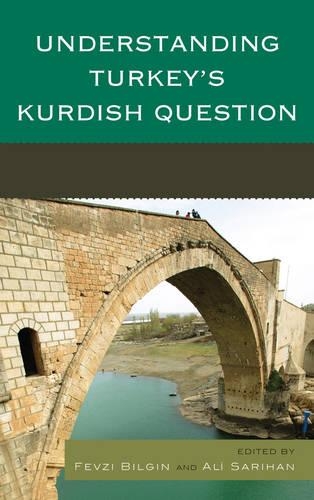
Understanding Turkey's Kurdish Question
(Paperback)
Publishing Details
Understanding Turkey's Kurdish Question
By (Author) Fevzi Bilgin
Edited by Ali Sarihan
Contributions by Djene Rhys Bajalan
Contributions by Oral alislar
Contributions by Fuat Keyman
Contributions by Umut zkirimli
Contributions by Cengiz andar
Contributions by Michael M. Gunter
Contributions by Kilic Bugra Kanat
Contributions by Hugh Pope
Bloomsbury Publishing PLC
Lexington Books
24th March 2015
United States
Classifications
Professional and Scholarly
Non Fiction
Social groups, communities and identities
305.8915971
Physical Properties
Paperback
272
Width 151mm, Height 230mm, Spine 20mm
404g
Description
This edited volume, comprising chapters by leading academics and experts, aims to clarify the complexity of Turkeys Kurdish question. The Kurdish question is a long-standing, protracted issue, which gained regional and international significance largely in the last thirty years. The Kurdish people who represent the largest ethnic minority in the Middle East without a state have demanded autonomy and recognition since the post-World I wave of self-governance in the region, and their nationalist claims have further intensified since the end of the Cold War. The present volume first describes the evolution of Kurdish nationalism, its genesis during the late nineteenth century in the Ottoman Empire, and its legacy into the new Turkish republic. Second, the volume takes up the violent legacy of Kurdish nationalism and analyzes the conflict through the actions of the PKK, the militant pro-Kurdish organization which grew to be the most important actor in the process. Third, the volume deals with the international dimensions of the Kurdish question, as manifested in Turkeys evolving relationships with Syria, Iraq, and Iran, the issue regarding the status of the Kurdish minorities in these countries, and the debate over the Kurdish problem in Western capitals.
Reviews
Considering the regional and international ramifications of the Kurdish question in the Middle East, the scholarly attention paid to this topic has historically been inadequate and the subject matter remains in need of serious study. It is therefore welcome that Understanding Turkeys Kurdish Question specifically sets out to examine the country with the largest Kurdish population in the world at a time when it is struggling to come to terms with this reality. This edited, multi-authored volume brings together both established and new scholars as well as veteran Turkish journalists, some of who have written extensively on the topic over the years. * Turkish Review *
As the ongoing negotiations between the Turkish government and the representatives of the Kurdish population have turned new attention on Kurdish studies, this multi-authored volume fills a vacuum in the analysis of Turkeys Kurdish question. ... [T]he volume provides a unique reference for scholars interested in grasping, in one reading, the multiple dimensions of Turkeys Kurdish question, as well as its future perspectives. Both experts and scholars approaching Kurdish studies for the first time will benefit from its clear-cut chapters and perceptive insights. * The International Spectator *
This volume, which consists of essays by renowned scholars and journalists, provides valuable information and commentary about the past and present of various aspects of the Kurdish question, and any student who would like to have an understanding of not only the earlier phases of the Kurdish issue but also the on-going solution process will benefit from it. * Insight Turkey *
Understanding Turkeys Kurdish Question is an excellent collection of essays on Turkeys most enduring political problem. It is a timely work enabling to look at the Kurdish question in Turkey from the perspectives of both past and present, from the eyes of both state and society. -- Mesut Yegen, Istanbul Sehir University
Author Bio
Fevzi Bilgin is the executive director of the Rethink Institute in Washington, DC. His areas of expertise are constitutional politics, religion and politics, political liberalism, Turkish politics, and Middle Eastern politics. He received Bachelors Degree from Ankara University and PhD in political science from University of Pittsburgh. He previously taught at Sakarya University and St. Mary's College of Maryland. He has published many articles and essays, including a monograph, Political Liberalism in Muslim Societies and most recently, an edited volume, Resolving Turkeys Kurdish Issue. Ali Sarihan is a doctoral candidate in School of Politics and International Relations at the University of Nottingham. He previously received MA degrees in Democracy and Governance at Georgetown University, Department of Government, and Comparative and International Affairs at Indiana University-Bloomington. His studies focus on social movements, revolutions, democratization, and strategic diplomacy tools in the Middle East and North Africa.
